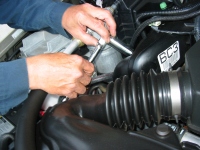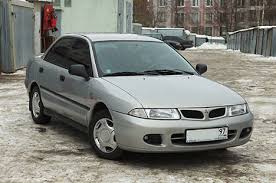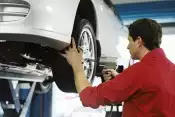Posted on 11/28/2012
Fan belts are important to cars. During the colder months, we see (and hear) more squealing fan belts. Wear and tear will eventually loosen all belts but in colder weather, metal engines and parts shrink a bit, causing loosening. A squealing belt is you car's way of warning you of problems and you should come in right away to have it looked it. In the old days, a car three or four fan belts, each one powering the alternator, water pump, air conditioner or power steering. If one belt broke, chances are you could at least make it to the next service station for repairs. Most newer cars just have one belt, called the serpentine belt, that threads through the engine and powers all these things. It's a more efficient system but if that belt breaks, the car will likely fail immediately due to loss of function to multiple systems. In addition to all the noise, a belt about to fail will also show signs of wear ... read more
Posted on 5/8/2012
A common cause of breakdowns is overheating, especially during summertime. Your cooling system should be completely flushed and refilled as recommended in your owner's manual. The level, condition, and concentration of the coolant should be checked periodically. (A 50/50 mix of anti-freeze and water is usually recommended.) If your car overheats - or if you are doing regular maintenance at home - never remove the radiator cap until the engine has thoroughly cooled. A professional should check the tightness and condition of drive belts, clamps, and hoses. Sources: U.S. Environmental Protection Agency, National Weather Service, National Highway Traffic Safety Administration, Federal Citizen Information Center, Washington State SAFE KIDS Coalition
Posted on 4/6/2012
Care and Maintenance Tips Keep Your Car Running in Top-Notch ConditionWe've compiled our best expert advice, surprising tricks, and car care tips to prolong the life of your automobile! 1. Be patient during the break-in period You've bought your dream car and now you want to make it last at long as possible in top condition. Here are some things to remember as you pull it out of the dealer's lot: During the break-in period, typically the first 1,000 miles (1,600 km), keep your speed under 55 mph (88 kpm) or to the speed recommended by your car's manufacturer. Avoid heavy loads on the drive train, such as towing trailers, and loading the roof rack or trunk with heavy construction materials. Do not allow your new car to idle for long periods - this is good advice for the life of your car, but especially during breakin. The oil pressure generated by doing so may not be sending oil to every part of your engine. Use only ligh ... read more
Posted on 3/16/2012

Keep Your Engine Properly Tuned Fixing a car that is noticeably out of tune or has failed an emissions test can improve its gas mileage by an average of 4 percent, though results vary based on the kind of repair and how well it is done. Fixing a serious maintenance problem, such as a faulty oxygen sensor, can improve your mileage by as much as 40 percent. Fuel Economy Benefit: 4% Equivalent Gasoline Savings: $0.15/gallon Keep Tires Properly Inflated You can improve your gas mileage by up to 3.3 percent by keeping your tires inflated to the proper pressure. Under-inflated tires can lower gas mileage by 0.3 percent for every 1 psi drop in pressure of all four tires. Properly inflated tires are safer and last longer. The proper tire pressure for your vehicle is usually found on a sticker in the driver’s side door jamb or the glove box and in your owner’s manual. Do not use the maximum pressure printed on the tire’s sidewall. Fuel Economy Benefi ... read more
Posted on 2/2/2012

Here is a great story about the 10 most reliable cars of the past decade. Of course, with proper maintenance, just about any car will give long life and reliable service, and abuse and neglect will kill any car in short order. The Mitsubishi Carisma isn't the hottest-looking car, but it ranks high in reliability and we maintain Japanese and American cars in our Boise auto shop. The 10 most reliable cars according to Warranty Direct: Honda Accord - A classy package, well put together and feels more special than the average family car. Superb engines and value for money. Subaru Forester - Not quite an off roader, much more than an estate with a sporty edge, making it the perfect combination. Great all round buy. Mazda MX-5 - Blueprint for the modern roadster with sweet handling and engines to match. Extremely easy to live with. Mits ... read more
Posted on 2/1/2012

Winter sweaters and boots have been packed away in favor of shorts and sandals. Has your vehicle benefited from the same maintenance you've performed on your closets? Warm weather means long weekend getaways and even longer vacation road trips, and taking the time to perform seasonal maintenance today can help avoid trouble later. Here are 10 tips for spring and summer car care. In some cases, you'll be able to perform these procedures yourself. Others are best done by a mechanic as part of a tune-up. Some will help your vehicle look better. Most will help it perform more efficiently and get better gas mileage. Get rid of road salt on the undercarriage.Road salt can damage your vehicle by eating away at its undercarriage. Use a garden hose with as much water pressure as your system can muster to loosen winter grime and salt. Or, if you have a movable lawn sprinkler that's low enough, set that under the vehicle to wash away what you can't reach. Check the tires.Tire pres ... read more
Posted on 1/9/2012
Keep your car running! Watch for Engine Warning Signs It's OK to drive your car short distances with certain warning lights illuminated or gauges out of their normal range, but there are three that you dismiss at your car's peril: the engine oil light, the engine temperature gauge and the brake light. A few minutes of an excessively hot engine or low oil pressure and the groceries you're hauling in the back could suddenly be worth more than your car. A couple of minutes with the brake light on and you might end up playing bumper cars with the Cadillac Escalade ahead of you. The one being driven by Tony Soprano. In a bad mood. Get in the habit of glancing at your engine's temperature gauge and warning lights. If the idiot lights come on, pull over as soon as it's safe to do so and shut off the engine. You might just save yourself an expensive engine rebuild Do Your Regular Maintenance Skipping regularly scheduled maintenance intervals is one of the quickest ways to a ... read more
Posted on 1/2/2012
Driving! Wow. Is that "check engine" light on again? Didn't you just have that looked at? Come to think of it, your car is approaching that age, isn't it? A bit more grumble in the engine, a touch more sway in the suspension - you hate to admit it, but every time you take old faithful into the shop, the same thought tickles the back of your brain: Is it time for a replacement? How much is too much to spend on repairs? It's a question we've all had to ask at one point or another. Perhaps it would help to have a basic sense of what auto maintenance typically costs over time. The average American household owns 1.9 vehicles and spends around 1.5 percent of its annual income on auto repairs. In 2004, the standard family unit earned $54,453, which means they laid out around $817 annually on repairs, or $408 per vehicle. That number does not include the 3.7 percent spent on gasoline and motor oil ($1,007 per car), or the 2.2 percent ($599 per car) shelled out for insurance [sourc ... read more
Posted on 12/15/2011
Whether you buy a used car from a dealer, a co-worker, or a neighbor, follow these tips to learn as much as you can about the car: Examine the car yourself using an inspection checklist. You can find a checklist in many of the magazine articles, books, and Internet sites that deal with buying a used car. Test drive the car under varied road conditions - on hills, highways, and in stop-and-go traffic. Ask for the car's maintenance record. If the owner doesn't have copies, contact the dealership or repair shop where most of the work was done. They may share their files with you. Talk to the previous owner, especially if the present owner is unfamiliar with the car's history. Have the car inspected by a mechanic you hire. Research the frequency of repair and maintenance costs on the models in auto-related consumer magazines. The U.S. Department of Transportation’s Vehicle Safety Hotline (1-888-327-4236) and website ... read more
Posted on 12/13/2011
Most people just arent familiar enough about the inner workings of their vehicles to determine whether an auto repair facility is honest and charges fair prices. Fortunately, there are a number of recommendations that will help provide assurance that an auto repair shop is both competent and honest. In the first place, dont choose a shop simply because its location is convenient. Youre just gamblingand you may be a big loser. The National Automotive Parts Association (NAPA) recommends that you find a reputable repair shop before you need repairs. You can make better decisions when youre not rushed or needing repairs immediately. When you first contact the shop, ask about its experience with your particular vehicle make and model and whether they specialize in certain types of repairs. Dont hesitate to ask the shop for a few references. Any facility that wants your business should be happy to provide them. A few minutes on the phone contacting references could save you a lot of ... read more